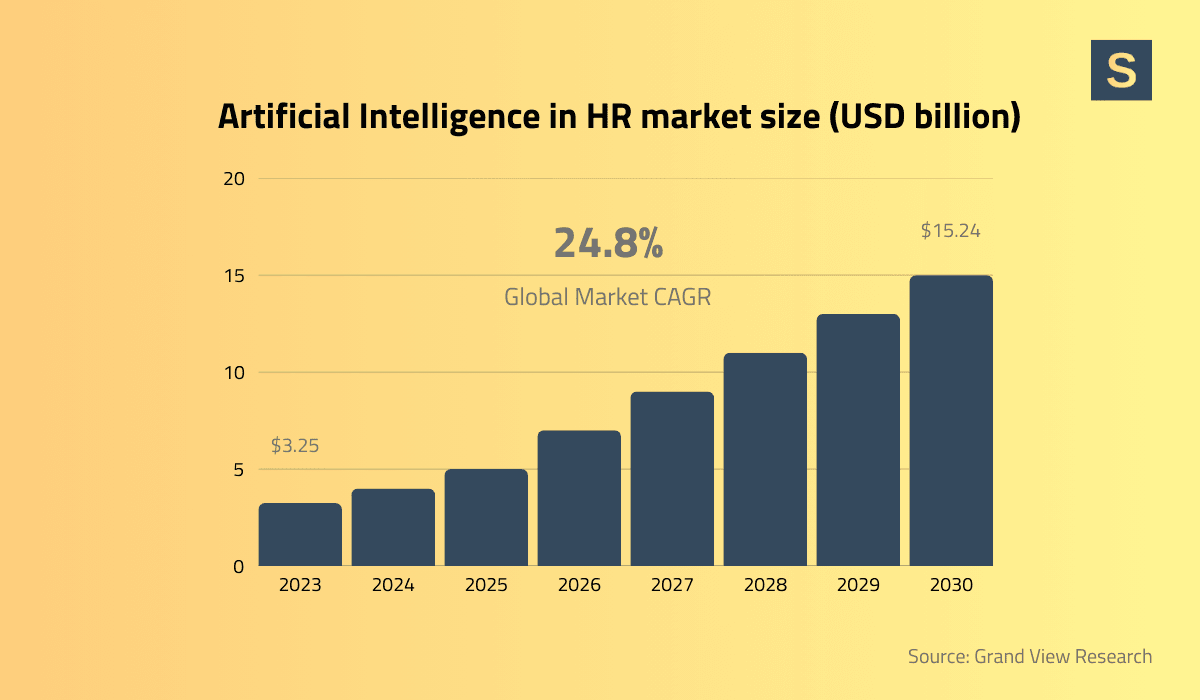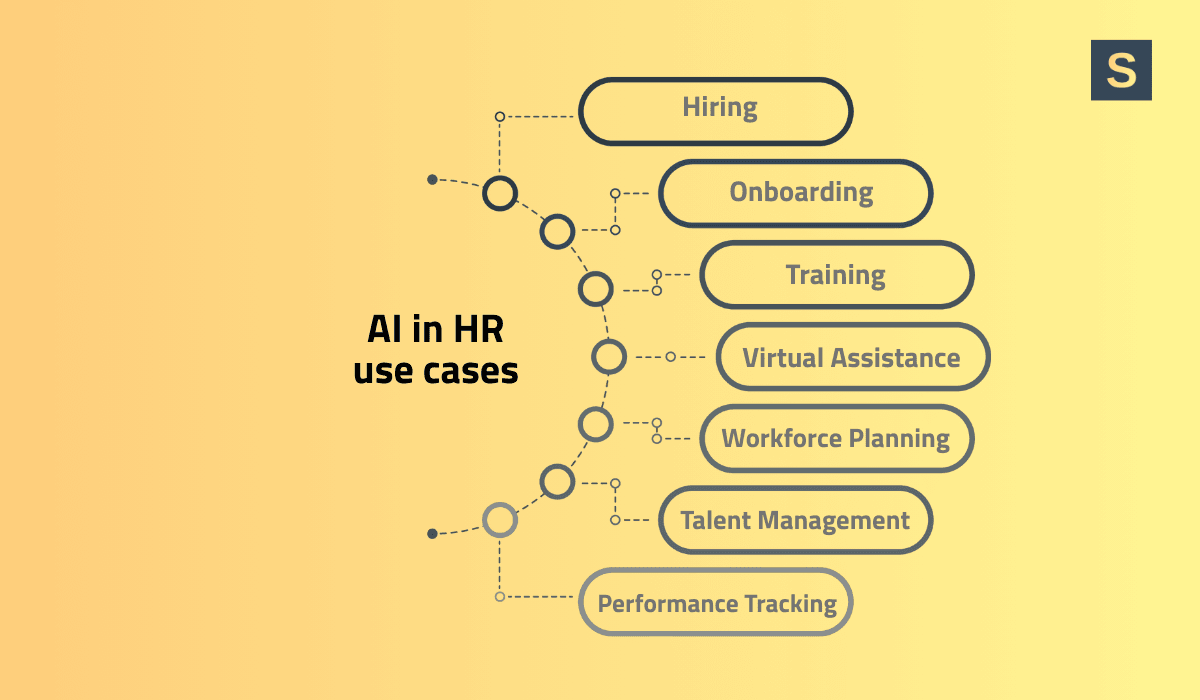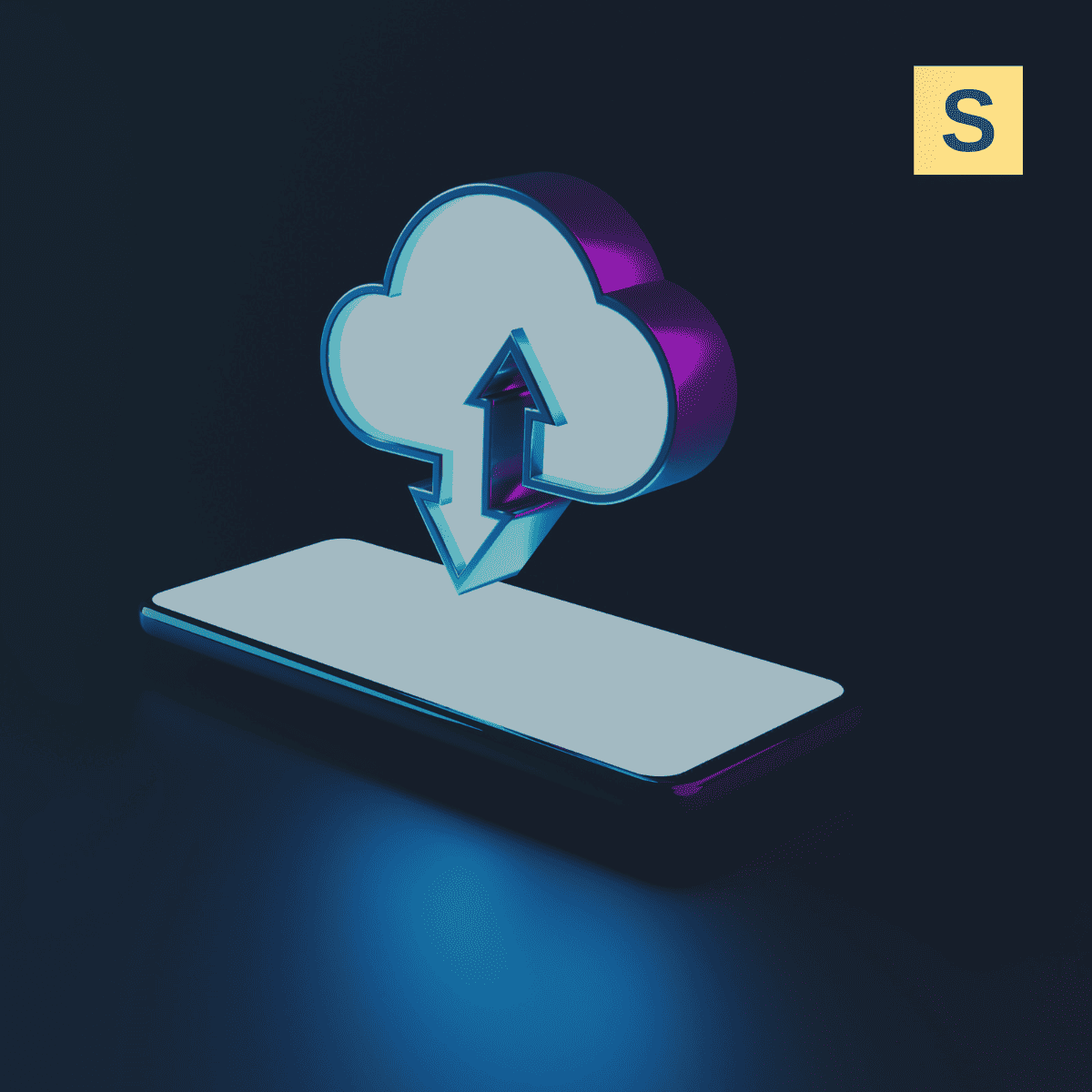Artificial Intelligence is profoundly transforming the landscape of HR management, becoming the central platform for a new, turbocharged evolution of HR processes. Over the past few years, AI has become an integral component of recruitment, training, employee assessment, engagement, and retention. Whether you aim to automate mundane tasks, increase employee engagement, or build an HRTech SaaS product, AI offers a wide range of solutions that can significantly enhance the efficiency of HR departments.
Read also: AI in SaaS: A Strategic Guide for Business Leaders
This article provides an in-depth analysis of how AI is used in recruiting and HR and discusses the key areas of AI implementation, including AI-enabled hiring, enhanced learning and development, and AI-driven forecasting and planning.
Artificial Intelligence in recruiting and HR: market overview
World AI in HR industry is expanding at a remarkable pace. As far as recent estimations are concerned, AI in HR industry reached $3.25 billion by 2023 and was projected to become $15.24 billion with a compound annual growth rate (CAGR) of 24.8% by 2030.

This growth is driven by several factors, including the adoption of automation in recruitment operations, increased personalization in learning, and the use of analytics to enhance employee performance.
By 2030, the majority of the AI HR market will focus on activities such as improving employee data analysis, streamlining internal processes, and implementing smart chatbots to handle employee queries. Above all, the adoption of machine learning and natural language processing (NLP) technologies will continue to grow, enabling improved recruitment recommendations and enhanced internal communications.
7 benefits of AI for human resources management
AI-based systems enable faster recruitment, minimize candidate selection errors, predict employee turnover, and monitor employee performance. They allow organizations to derive more objective insights from data, reducing subjective factors and human bias. Implementing AI in HR not only streamlines company processes but also boosts employee satisfaction and engagement, directly influencing overall productivity and organizational success.
Utilizing AI in HR operations is one of the key HR technology trends that greatly enhances the productivity and effectiveness of the HR function. Among the primary benefits that AI for human resources are:
Automate repetitive tasks. AI can handle much of the routine work, such as resume screening, interview scheduling, and paperwork. This frees HR professionals from administrative tasks, allowing them to focus on more strategic initiatives like fostering corporate culture or improving employee engagement.
Chatbots and applicant tracking systems (ATS) can filter resumes, schedule interviews, and even conduct preliminary interviews, streamlining recruitment and saving time.
Improved quality of hire. AI helps HR professionals shortlist candidates more accurately and objectively by using algorithms to screen resumes against job requirements and evaluate potential candidates on parameters such as experience, skills, behavior, and cultural fit.
For example, machine learning software can analyze large volumes of candidate data, including previous employers’ performance ratings, to identify the best fit for open positions. This reduces human error and increases accuracy in candidate selection.
Personalized learning. AI facilitates the creation of personalized training and development programs based on employees’ professional needs and career goals. Algorithms can cross-reference employees’ existing knowledge and skills, identify gaps, and recommend relevant courses or training opportunities.
Predicting employee turnover. AI can help organizations predict the likelihood of employee departures by analyzing behavioral patterns, engagement levels, feedback, and related data.
For example, by tracking how frequently an employee interacts with management and their satisfaction levels, AI can alert HR to potential resignations. This allows for proactive measures, such as improving work conditions, redistributing responsibilities, or initiating personalized communication to retain talent.
Improving employee engagement. AI analyzes staff sentiment and engagement by processing data from surveys, conversations, and even open sources like social media. These programs can automatically perform sentiment analysis and detect early signs of dissatisfaction.
For instance, if the system identifies declining performance within a specific team, it may recommend interventions such as offering professional development or organizing motivational events.
Managing diversity and inclusion. AI helps streamline diversity and inclusion efforts by tracking representation across different employee groups and ensuring hiring processes remain inclusive and unbiased. AI-based systems prioritize candidates’ skills and experience over personal characteristics like gender, age, or ethnicity, promoting fairness in recruitment.
Reducing human mistakes. Human involvement in hiring and firing processes can lead to errors driven by personal bias, stereotypes, or outdated methods. AI eliminates such errors by relying on objective data and analytical tools that consider a broader range of variables, making the processes more transparent, efficient, and fair.
Integrating AI into human resource management not only automates redundant tasks but also enhances decision-making, increases employee engagement, delivers personalized training, and predicts turnover. Collectively, these improvements make HR activities more agile, productive, and aligned with the organization’s strategic goals.
Read also: How to Build Custom HR Tech SaaS Solutions
7 AI in HR use cases: from hiring to engagement management
Artificial Intelligence is profoundly transforming several aspects of human resources management, offering novel solutions that make HR processes more efficient, personalized, and accurate. Let us examine a few real-world examples of AI in HR.

AI in hiring and recruitment. Artificial Intelligence can help automate resume screening, analyze candidate behavior, predict onboarding success, and uncover hidden competencies. It can improve the hiring process for both businesses and job seekers.
For example, we worked with Supamatch to help them build AI Ignition, an AI-powered resume builder that allows job candidates to maximize their chances of success. It helps to optimize the hiring process in terms of quality as well as accelerate it in terms of time.
Onboarding and offboarding using AI. AI-based solutions enable smoother onboarding of new employees by providing them with all the information they need about the company, procedures, and their roles. These supportive tools make the first day of work less overwhelming, more organized, and more informative.
During offboarding, AI facilitates the collection of feedback from departing employees, processes their reasons for leaving, and identifies areas where workflow improvements may be needed.
Training and upskilling. AI can be used to create personalized training modules aligned with employees' career goals and current skill sets. For example, a platform built using AI can recommend training and courses that empower employees with the skills they need to advance their careers. This not only enhances productivity but also fosters a more engaged workforce.
Chatbots and virtual assistants in HR. AI chatbots and virtual assistants answer repetitive employee questions, such as leave requests, company policy inquiries, or guidance through standard processes. Tools like Leena.ai and similar platforms provide employees with 24/7 assistance, freeing HR from routine administrative tasks.
AI-powered workforce planning. AI can analyze staff performance, current business needs, and future requirements to optimize staffing levels and arrangements. This is especially useful during seasonal workload fluctuations, when accurate resource predictions are essential. AI can also help anticipate skill shortages and recommend strategies to address them.
Talent management with AI. AI can help identify top performers and support talent-retention efforts through targeted career development programs. AI-based systems can highlight high-potential employees to HR and recommend personalized career enrichment initiatives, improving both retention and team productivity.
Performance and engagement management. AI algorithms can monitor employee mood, performance, and engagement, enabling HR professionals to respond to issues promptly. For example, AI tools can provide real-time feedback from surveys, audits, and discussions, helping HR assess employee sentiment and recommend strategies to boost motivation, satisfaction, and overall team performance.
AI in HR activities enhances decision-making, improves the employee experience, and even anticipates problems before they arise. It supports more personalized training, employee development, and engagement, leading to better business outcomes for the organization.
Read also: AI Agent vs AI Chatbot: What to Choose for Your Business
AI adoption in HR: challenges and best practices
Although AI offers significant benefits to HR, its adoption may encounter difficulties. The expected challenges range from technical to organizational. Below are the key challenges organizations may face when implementing AI-based solutions, along with advice on how to overcome them:
Data quality. AI requires accurate and complete data to function effectively. Without high-quality data, AI algorithms may produce incorrect conclusions, leading to poor decisions, such as selecting unsuitable candidates or inaccurately predicting employee performance. This can damage the company’s reputation and result in higher costs.
Collecting, pre-cleaning, and standardizing high-quality data are essential parts of developing AI applications. You may need to engage data scientists to help prepare datasets and select appropriate AI models.
Ethical and legal implications. AI adoption in HR raises serious ethical issues. Transparency and fairness must be ensured within the algorithms, particularly during recruitment. Misconfigured algorithm settings can lead to amplified gender, racial, or age biases.
There is also a need to comply with data protection laws, such as the GDPR, to safeguard candidate and employee personal data. Transparency and explainability of AI algorithms are key to effective and responsible implementation.
Integration with legacy systems. Adopting AI involves not only re-engineering business processes but also integrating AI solutions with existing HR systems, such as time management platforms, applicant tracking systems, and employee development tools. This may require upgrading IT infrastructure, investing in staff training, and adapting systems to accommodate new algorithms.
The solution adopted should work harmoniously with the firm’s existing systems and should not disrupt current work processes.
Resistance to change. The greatest obstacle to AI adoption is often human resistance. Employees may fear that AI will replace them or diminish the value of their work. This perception can lead to resistance and reduced efficiency in adopting new technology.
A change management plan that includes employee training and participation is essential to help employees view AI as a helpful assistant rather than a threat.
Read also: How to Modernize Legacy Systems With AI-Assisted Approach
How to implement AI in HR: recommendations
Companies implementing AI in HR are proceeding cautiously and deliberately. In practice, this means most organizations begin with pilot projects in small, targeted areas; for example, automating repetitive résumé filtering or using analytics to track employee engagement. This approach allows you to test technologies in real-world settings, lower risks, and identify potential issues early, before rolling out solutions across all HR functions.
Transparency in algorithms is becoming increasingly important. Employees and candidates want to understand how decisions are made; whether regarding interview offers, training recommendations, or career advancement opportunities. Explainability of AI models is now a key factor in building trust and avoiding ethical or legal controversies. In light of increasingly stringent AI regulations, transparency is not only an ethical imperative but also a commercial necessity.
This shift also changes the competency requirements for HR teams. Collaborating with AI-powered tools demands new knowledge and skills, including data interpretation and familiarity with algorithmic processes. As a result, businesses are actively investing in developing the digital competencies of their HR practitioners to ensure they can use technology effectively, sensitively, and responsibly in workforce management.
Read also: AI Coding Assistants Comparison: Best AI Tools for Coding
What is the future of HR with AI?
In the near future, AI will become an integral part of standard HR practice and a routine tool in strategic human resource management. Beyond automating routine tasks, AI offers new capabilities to optimize recruitment, hiring, and employee development processes.
The HR AI market will be valued at $30.77 billion in 2034. This confirms the growing need for implementing Artificial Intelligence in HR to stay competitive. AI adoption offers small and mid-sized businesses an opportunity to simplify processes, enhance the employee experience, and implement a more sustainable, adaptable HR model in response to shifting market conditions.
Check out our HR software development services to learn how we can help you level up your business with AI and more modern technologies.




